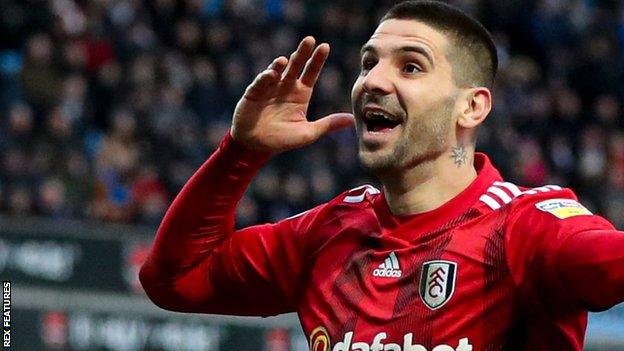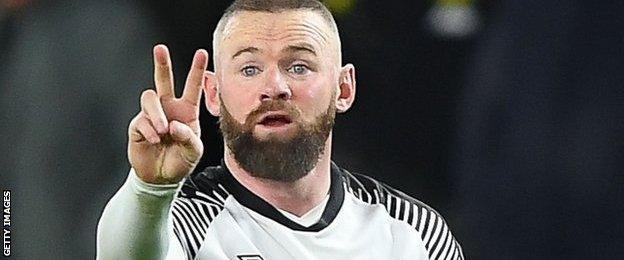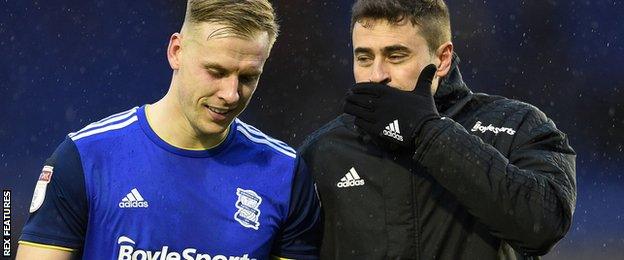Championship returns: How things stand & what's new since a ball was last kicked
- Published

Aleksandar Mitrovic is the Championship's top scorer with 23 goals
The 2019-20 Championship season resumes on Saturday, more than three months since the league was suspended just hours before Fulham were due to host Brentford on 13 March.
Initially, the intention was to have teams playing again on 3 April - but the hiatus has proved to be much longer because of the lockdown made necessary by the coronavirus pandemic.
For the remainder of the campaign, all sides will wear shirts bearing an emblem paying tribute to the NHS for their work on the front line.
Here’s a recap of how the promotion race and battle to avoid relegation look, with 24 teams getting ready to play nine games behind closed doors to complete the regular season.
A two-horse race?
It’s been hard to look past Leeds United and West Bromwich Albion for the automatic promotion places for most of the season.
Before football was halted Leeds had returned to the top of the table thanks to a superb run of five successive wins without conceding a goal.
The Whites are one point clear of the Baggies, who have won just two of their past five matches.
West Brom’s wobble has opened the door for Fulham to potentially spring a surprise and haul themselves into the top two.
However, Scott Parker’s side - who are six points behind Slaven Bilic’s Albion - face a tough return with their first two games at home to fourth-placed Brentford and away at Elland Road.
The Bees and Nottingham Forest both have a slim chance of getting into the top two but, with both clubs 10 points behind West Brom, a place in the play-offs seems far more likely.
The play-off contenders
With only 10 points separating as many clubs (from fourth-placed Brentford down to QPR in 13th) the restart could produce an almighty scrap for at least three play-off places.
Preston North End are sixth but have a single-point advantage over the chasing pack following four defeats in five, but seventh-placed Bristol City were unable to capitalise - going winless over the same period.
Millwall and Cardiff are two points behind Preston after recording victories the weekend before the suspension hit, while Blackburn are another side very much in the mix - although Rovers are four matches without a win.
Swansea City were among the pace-setters at the start of the season but slipped out of the top six at the end of January, yet they find themselves still only three points off the play-offs despite one win in nine.

Wayne Rooney has scored four goals in 15 appearances since joining Derby as player-coach in January
Derby County, last season’s beaten play-off finalists, took time to find their feet under new coach Phillip Cocu, bouncing around the lower half while contending with off-field issues. However, back-to-back wins before the season was halted lifted the Rams into the top half for the first time since November.
QPR were a side in form, winning three times in a five-game unbeaten run, putting them six points away from the play-off places.
Reading, Sheffield Wednesday and Birmingham City find themselves in the no-man’s land of the Championship and, barring an extreme set of results, are all heading for mid-table obscurity.
Three from eight at the bottom?
With eight points separating the bottom eight clubs, the relegation battle could also prove tense.
Bottom club Barnsley have it all to do, seven points from safety, and are in need of a huge turnaround to stay up.
One point above them are Luton Town, back under the stewardship of Nathan Jones.
The Welshman was instrumental as the Hatters secured successive promotions from League Two to the Championship in 2018 and 2019 and will be looking to provide the inspiration for an unlikely survival bid.
Charlton Athletic, who have endured a tumultuous season off the pitch, occupy the final relegation place after four defeats in five.
Another club struggling are Hull City, who went 11 games without a win amid an injury crisis, while influential forwards Jarrod Bowen and Kamil Grosicki left the club in January.
The Tigers, Wigan Athletic and Middlesbrough are only two points above the drop zone, but the situation is more positive for Paul Cook and Jonathan Woodgate's men.
The Latics recorded three wins in a six-match unbeaten stretch, giving them a far brighter outlook than others around them, while Boro ended a poor run of results with victory at Charlton in their last game and could be boosted by the return of some long-term injury absentees.
Stoke City and Huddersfield Town are both three points clear of trouble but know they have little room for error.
The Terriers, relegated from the Premier League last season, endured a torrid start to the campaign but their recent home form has been good.
Similarly, the Potters have recovered pretty well since an early season change of manager saw Michael O’Neill replace Nathan Jones in November, but the former Northern Ireland boss had to self-isolate earlier this month after a positive test for coronavirus, leading to the cancellation of a friendly.
With all clubs lacking competitive action for over 100 days, though, the well-worn cliche of throwing the form book out of the window has never been more pertinent.
What has happened since a ball was last kicked?
Just two days after the campaign was suspended, Derby player-coach Wayne Rooney accused the government and footballing authorities of using players as “guinea pigs” during the early days of the outbreak.
On 17 March, Championship clubs unanimously agreed to complete the season at a meeting via video link - but dissent would come later.
April brought an EFL appeal against the decision of an independent disciplinary committee to clear Birmingham of a misconduct charge.
BBC Radio WM reported on 11 June that the EFL had won its appeal, although Blues crucially avoided a points deduction which could have put them in the thick of the relegation fight.

The final nine games of the season will be Pep Clotet's last in charge of Birmingham
Three days earlier, City had announced head coach Pep Clotet would leave at the end of the season.
Luton, meanwhile, parted company with boss Graeme Jones on 24 April after just under a year in charge. The Hatters took the decision to “reduce its cost base”, and several other clubs agreed wage deferrals or reductions with players and staff to help them ease the financial strain of the pandemic.
The regular season was due to finish on 2 May, and as the month went on several clubs made pronouncements about a possible restart.
On 19 May, Hull said they were “disappointed” that a club letter reportedly opposing the resumption was leaked, and three days later Leeds chief executive Angus Kinnear stated it would be a “national embarrassment” if the top two divisions in England were not played to a conclusion.
The EFL announced the first results of Covid-19 tests on 24 May, the same day Huddersfield owner Phil Hodgkinson warned that 50-60 clubs could go bust if football failed to plan for the financial impact of the pandemic.
At the end of May, the EFL announced the Championship would return on 20 June - some welcomed the move, but the following day QPR said they were “vehemently opposed” to that restart date, while Sheffield Wednesday boss Garry Monk described the plan as “unfair” as Premier League clubs would have had an extra week to prepare for the season's resumption.
Wigan were taken over on 4 June and Charlton, who saw a boardroom row rumble on during lockdown while the EFL began an investigation into East Street Investment’s purchase of the club in January, had a new owner installed on 10 June.
Yet the Addicks were dealt a blow when top scorer Lyle Taylor was among three players who refused to return to training or play when the league resumed for contractual or safety reasons.
In the meantime, the EFL announced all remaining games would be available to watch online for club season-ticket holders.
Additional reporting by Ian Woodcock.